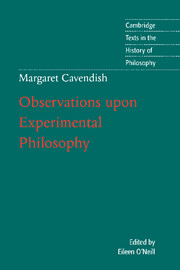Book contents
- Frontmatter
- Contents
- Acknowledgement
- List of abbreviations
- Introduction
- Chronology
- Further reading
- Note on the text
- Observations upon Experimental Philosophy
- To Her Grace the Duchess of Newcastle
- To His Grace the Duke of Newcastle
- To the Most Famous University of Cambridge
- The Preface to the Ensuing Treatise
- To the Reader
- An Argumental Discourse
- The Table of All the Principal Subjects
- Observations upon Experimental Philosophy
- Further Observations upon Experimental Philosophy
- Observations upon the Opinions of Some Ancient Philosophers
- Glossary
- Index
- Cambridge texts in the history of philosophy
Further Observations upon Experimental Philosophy
Published online by Cambridge University Press: 05 June 2012
- Frontmatter
- Contents
- Acknowledgement
- List of abbreviations
- Introduction
- Chronology
- Further reading
- Note on the text
- Observations upon Experimental Philosophy
- To Her Grace the Duchess of Newcastle
- To His Grace the Duke of Newcastle
- To the Most Famous University of Cambridge
- The Preface to the Ensuing Treatise
- To the Reader
- An Argumental Discourse
- The Table of All the Principal Subjects
- Observations upon Experimental Philosophy
- Further Observations upon Experimental Philosophy
- Observations upon the Opinions of Some Ancient Philosophers
- Glossary
- Index
- Cambridge texts in the history of philosophy
Summary
Ancient Learning Ought Not to be Exploded, nor the Experimental Part of Philosophy Preferred Before the Speculative
In this present age those are thought the greatest wits that rail most against the ancient philosophers, especially Aristotle, who is beaten by all; but whether he deserves such punishment, others may judge. In my opinion, he was a very subtle philosopher, and an ingenious man; It is true, he was subject to errors, as well as other men are, (for there is no creature so perfect but may err, nay, not nature herself; but God only who is omnipotent) but if all that err should be accounted fools, and destitute of regular reason, then those deserve it most, who think themselves wiser than they are, and upon that account few in this age would escape this censure. But concerning the opinions of ancient philosophers, condemned by many of our modern writers, I for my particular, do very much admire them; for although there is no absolute perfection in them, yet if we do but rightly consider them, we shall find, that in many things, they come nearer to truth than many of our moderns; for surely the ancients had as good and regular rational and sensitive perceptions, and as profitable arts and sciences as we have; and the world was governed as well, and they lived as happily in ancient times, as we do now, nay more.
- Type
- Chapter
- Information
- Margaret Cavendish: Observations upon Experimental Philosophy , pp. 195 - 248Publisher: Cambridge University PressPrint publication year: 2001



